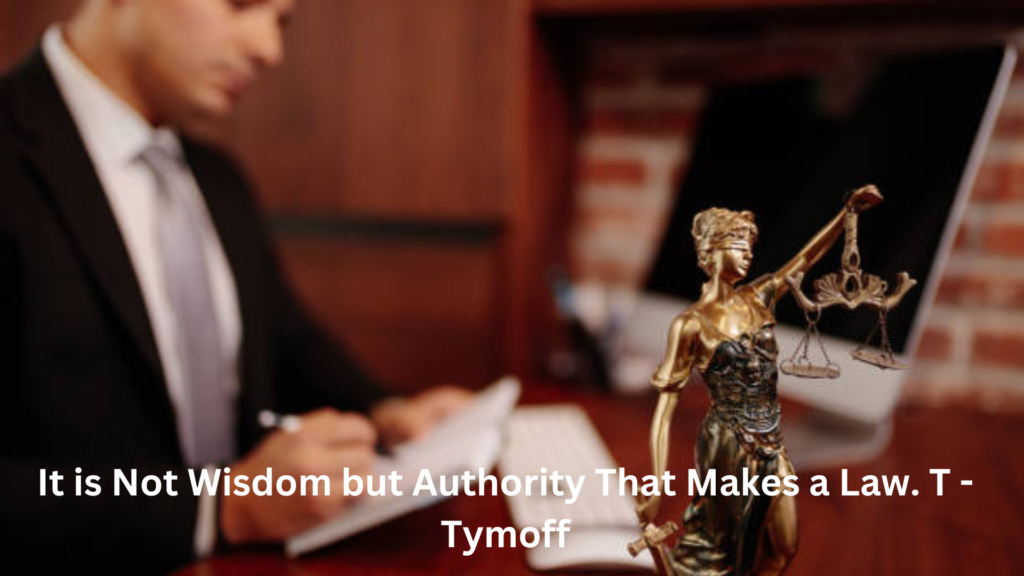The quote “It is not wisdom but authority that makes a law. T – Tymoff” captures a profound reality about the nature of lawmaking. In this statement, the author distinguishes between two essential aspects of law: authority and wisdom. While the power to create and enforce laws comes from authority, the ethical and rational foundation behind those laws stems from wisdom. This creates an intriguing dynamic in the lawmaking process and raises questions about how authority and wisdom should work together for the greater good of society.
This article will explore the implications of “It is not wisdom but authority that makes a law. T – Tymoff” and how it highlights the balance between power and morality in legislation.
Understanding the Role of Authority in Lawmaking
Laws are the foundation of any society, providing structure, order, and guidelines for behavior. Authority in lawmaking refers to specific individuals or institutions’ power to create, modify, and enforce laws. This power typically comes from a governmental body, such as a legislature, parliament, or even a monarch in some systems.
The authority to create laws often stems from democratic processes, where elected officials represent the people and enact laws. In authoritarian regimes, however, the power to make laws is concentrated in the hands of a few or a single leader. In both cases, authority is essential for the establishment of legal frameworks.
While authority is necessary for lawmaking, “It is not wisdom but authority that makes a law. T – Tymoff” suggests that authority alone does not guarantee the quality or wisdom of passed laws. Authority allows for the creation of laws, but it does not ensure that they will be just, fair, or beneficial for society.
The Importance of Wisdom in Lawmaking
Wisdom in lawmaking goes beyond mere knowledge or technical expertise; it refers to the ability to make decisions that promote justice, fairness, and the well-being of society. When wisdom is absent, laws may be created without considering their moral or ethical implications, leading to unjust outcomes.
Wisdom is essential for balancing the needs of different societal groups, understanding the long-term impact of laws, and ensuring that laws align with fundamental human rights. A wise lawmaker will consider various perspectives, weigh potential consequences, and ensure that the rules they create are just, equitable, and beneficial for all.
In contrast to authority, which focuses on enforcing laws, wisdom focuses on creating just and beneficial laws. The presence of wisdom in lawmaking helps ensure that authority is exercised responsibly and in a way that serves the greater good.
The Conflict Between Authority and Wisdom
The tension between authority and wisdom is at the heart of “It is not wisdom but authority that makes a law. T – Tymoff.” While authority is necessary to create laws, it is only sometimes accompanied by wisdom. This discrepancy can lead to laws being passed not because they are just or wise, but because those in power have the authority to impose them.
This tension becomes particularly apparent when laws are created without considering their consequences. Laws based solely on authority may ignore the needs or rights of certain groups or be designed to serve the interests of those in power rather than the public. In such cases, the authority behind the law may overshadow the wisdom needed to create rules that genuinely benefit society.

The Consequences of Prioritizing Authority Over Wisdom
Several negative consequences can arise when authority is prioritized over wisdom in lawmaking. These include:
- Injustice and Inequality: Laws created without wisdom may disproportionately affect marginalized or vulnerable groups. Without thoughtful consideration of the social and ethical implications, laws can perpetuate inequalities or violate fundamental human rights.
- Lack of Accountability: If authority is the sole basis for lawmaking, those in power may feel free to justify or explain their decisions. This lack of accountability can lead to arbitrary or oppressive laws that serve the interests of a select few rather than the common good.
- Short-Term Thinking: Laws created with little wisdom often focus on immediate goals or political expediency rather than long-term societal benefits. This can result in laws that do not address the root causes of issues or create unintended negative consequences.
- Erosion of Trust: When people perceive that laws are being created without wisdom or fairness, trust in the legal system and government can erode. This can lead to social unrest and undermine the legal system’s legitimacy.
Striking the Right Balance Between Authority and Wisdom
Legislators must strike the right balance between authority and wisdom. While authority is necessary for creating and enforcing laws, wisdom is essential for ensuring that laws are just, fair, and beneficial to society.
Lawmakers should be mindful of the moral and ethical implications of the laws they create. This requires an understanding of the broader social context and a commitment to serving the needs of all citizens. Ideally, authority and wisdom should work hand in hand, with authority providing the power to enact laws and wisdom guiding their creation and implementation.
Read Also : Exploring the World of Bizhunet: A Comprehensive Review.

Conclusion
“It is not wisdom but authority that makes a law. T – Tymoff” serves as a powerful reminder of the distinction between power and morality in lawmaking. Authority enables lawmakers to create laws, but wisdom is needed to ensure those laws are and serve the greater good. The balance between these two forces is crucial for creating fair, effective, and sustainable legal systems. Ultimately, lawmaking should not be solely about exercising power, but about using that power responsibly to make laws that reflect justice, fairness, and the well-being of all.
































Comments 1